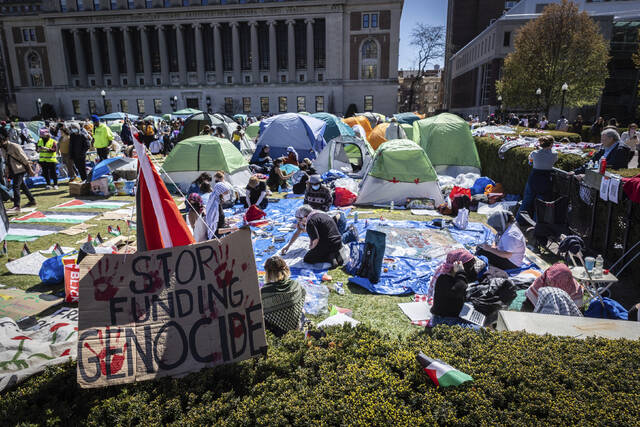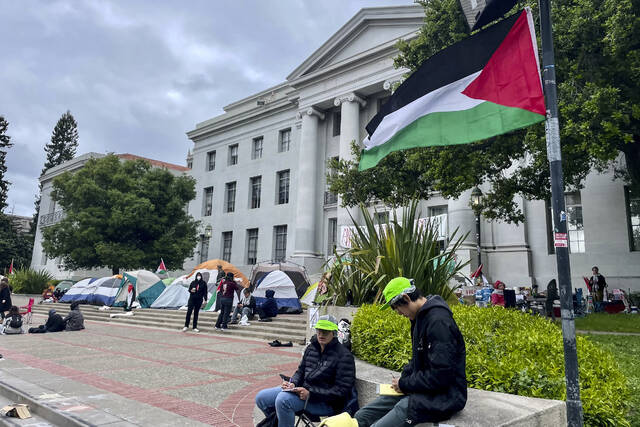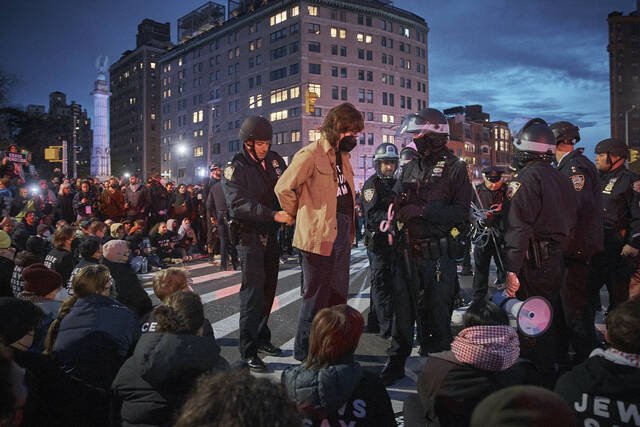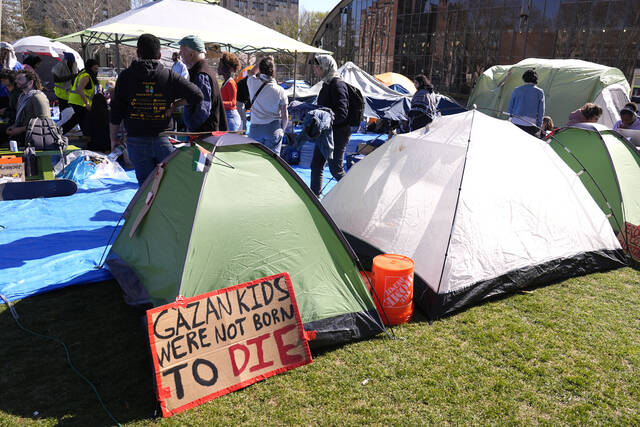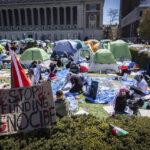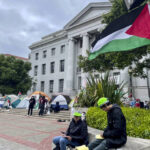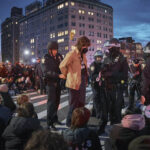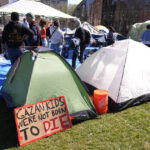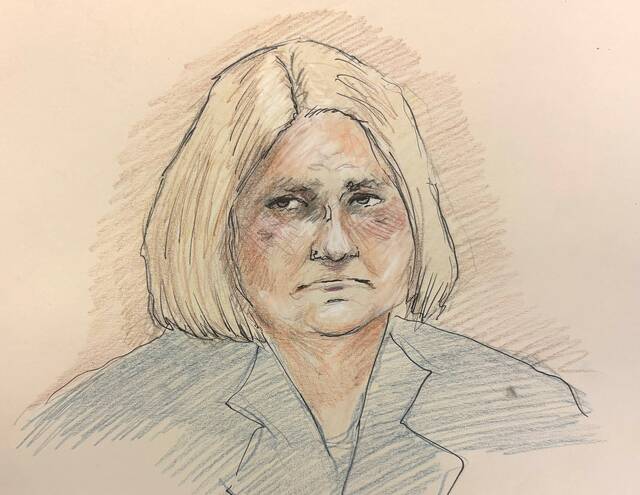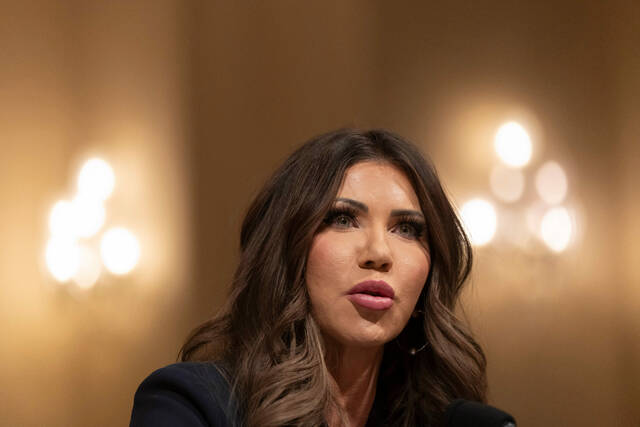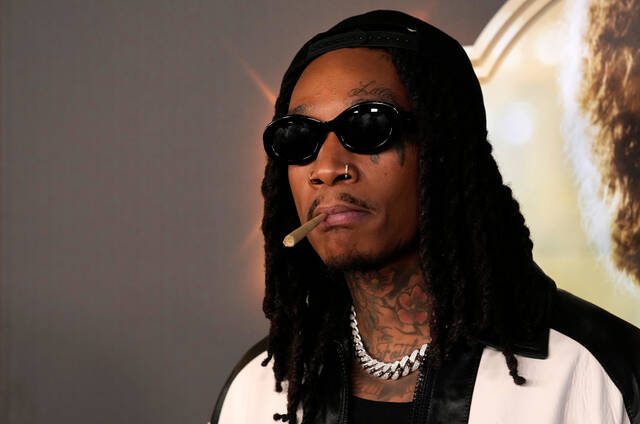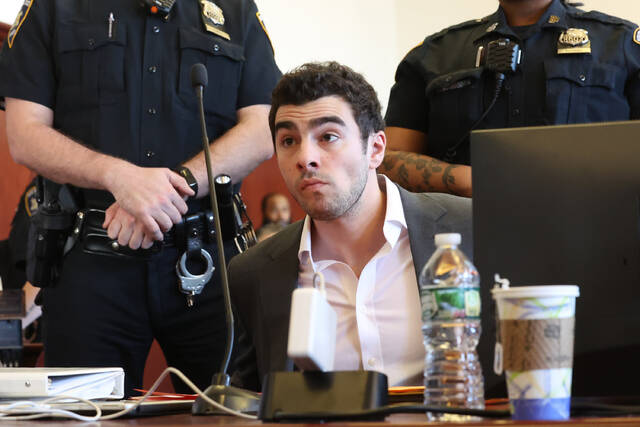NEW YORK — Columbia University said early Wednesday that it was making “important progress” with pro-Palestinian student protesters who set up a tent encampment and that it was extending a deadline to clear out, yet standoffs remained tense on the Ivy League campus in upper Manhattan.
Student protesters “have committed to dismantling and removing a significant number of tents,” the university said in a statement. A smaller encampment remained on campus Wednesday morning.
Across the country, protesters at California State Polytechnic University, Humboldt, some 300 miles north of San Francisco, started using furniture, tents, chains and zip ties to block the building’s entrances Monday evening.
Both campuses are part of intensifying demonstrations over Israel’s war with Hamas by university students demanding that schools cut financial ties to Israel and divest from companies that are enabling its monthslong conflict. Dozens have been arrested on charges of trespassing or disorderly conduct.
Columbia President Minouche Shafik in a statement Tuesday set a midnight deadline to reach an agreement with students to clear the encampment, or “we will have to consider alternative options.”
By around 3 a.m., the university said that there was “constructive dialogue” and that it will continue conversations for 48 hours.
The statement said student protesters “will ensure that those not affiliated with Columbia will leave. Only Columbia University students will be participating in the protest.”
Student protesters also will comply with city fire department requirements and “have taken steps to make the encampment welcome to all and have prohibited discriminatory or harassing language,” the statement said.
The university’s statement was released hours before U.S. House Speaker Mike Johnson’s trip to Columbia to visit with Jewish students and address antisemitism on college campuses.
Earlier Tuesday night, police arrested more than 200 protesters blocking traffic during a non-college demonstration demanding a permanent cease-fire in Gaza at Grand Army Plaza in Brooklyn, near the home of Sen. Chuck Schumer. The protest was organized by Jewish Voice for Peace on the second night of Passover, and protesters lay down a large circular banner depicting the food on a Seder plate.
At Cal Poly Humboldt, protesters chanted, “We are not afraid of you!” before officers in riot gear pushed into them at the building’s entrance, video shows. Student Peyton McKinzie said she was walking on campus Monday when she saw police grabbing one woman by the hair, and another student having their head bandaged for an injury.
“I think a lot of students are in shock about it,” she said.
Three students have been arrested, according to a statement from the school, which down the campus until Wednesday. Students had occupied a second campus building Tuesday.
Another encampment was set up Tuesday at the University of Rochester in upstate New York. Omar Darwesh, a Palestinian senior, said he has lost relatives to the war.
“We’re not calling for the destruction of Israel, we’re never talking about threatening Jews — the focus is on us and what we need, and that’s being treated like a human. We have to find a way to coexist,” he told TV station WHEC.
University of Rochester officials said in a statement that the protesters must follow ground rules, including presenting university identification if asked.
The upwelling of demonstrations has left universities struggling to balance campus safety with free speech rights. Many long tolerated the protests, which largely demanded that schools condemn Israel’s assault on Gaza and divest from companies that sell weapons to Israel.
Now, universities are doling out more heavy-handed discipline, citing safety concerns as some Jewish students say criticism of Israel has veered into antisemitism.
Protests had been bubbling for months but kicked into a higher gear after more than 100 pro-Palestinian demonstrators who had camped out at Columbia were arrested Thursday.
By late Monday at New York University, police said 133 protesters were taken into custody and all had been released with summonses to appear in court on disorderly conduct charges.
In Connecticut, police arrested 60 protesters, including 47 students, at Yale after they refused to leave an encampment on a plaza at the center of campus.
Yale President Peter Salovey said protesters had declined an offer to end the demonstration and meet with trustees. After several warnings, school officials determined “the situation was no longer safe,” so police cleared the encampment and made arrests.
A demonstration Tuesday at the University of Michigan grew to nearly 40 tents, and nine war protesters at the University of Minnesota were arrested after police took down an encampment in front of the library. Hundreds rallied in the afternoon to demand their release.
Harvard University in Massachusetts has tried to stay a step ahead of protests by locking most gates into its famous Harvard Yard and limiting access to those with school identification. The school has also posted signs that warn against setting up tents or tables on campus without permission.
Literature doctoral student Christian Deleon said he understood why the Harvard administration may be trying to avoid protests but said there still has to be a place for students to express what they think.
“We should all be able to use these kinds of spaces to protest, to make our voices heard,” he said.
Ben Wizner, a lawyer with the American Civil Liberties Union, said college leaders face extremely tough decisions because they have a responsibility to ensure people can express their views, even when others find them offensive, while protecting students from threats and intimidation.
The New York Civil Liberties Union cautioned universities against being too quick to call in law enforcement in a statement Tuesday.
“Officials should not conflate criticism of Israel with antisemitism or use hate incidents as a pretext to silence political views they oppose,” said Donna Lieberman, the group’s executive director.


